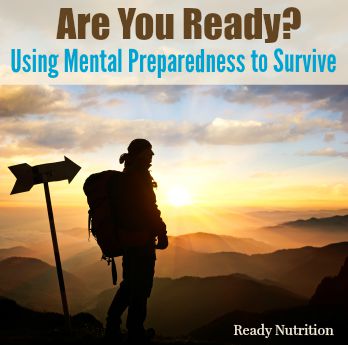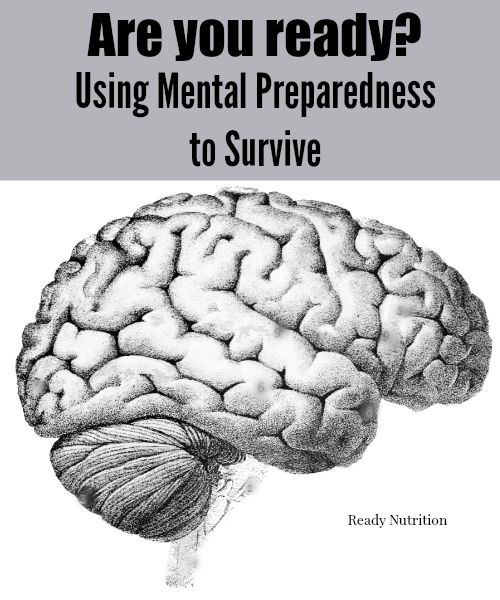 Do you want the real secret to surviving a disaster? You can’t keep it in your bug out bag. It’s not something you stash away at your home.
Do you want the real secret to surviving a disaster? You can’t keep it in your bug out bag. It’s not something you stash away at your home.
Here’s a hint: it’s all in your head.
The mind is a very powerful tool and having the right frame of mind to handle the stress of a disaster is a key component to surviving the event.
Unfortunately, mental preparation is usually pushed far back on the list of priorities. But without mental preparedness, many succumb to a traumatic event, due to distress, shock, indecision, panic or just giving up because the situation is too difficult. When it comes to survival techniques, there are many who feel confident with their knowledge and skills, but without the without a determined state of mind, panic will set in and mistakes will be made.
The Mental Game
When fear strikes, it causes stress and anxiety, which can lead to poor decision-making, paralysis, and hopelessness. Mental preparation creates resilience and keeps a person moving on. Maintaining a positive, hopeful attitude in the wake of a disaster can literally keep a person alive; giving them the will to keep putting one foot in front of the other. When a person begins to doubt they will see tomorrow, they need to cling to hope and optimism. On the other hand, Chris Carrington notes “there are far too many possible scenarios that can present themselves to us in the aftermath of any national or global disaster for us to assume we will be able to deal simply and easily with the choices we have to make. Maintaining our normal levels of honesty, integrity and decency will not always be possible and acknowledging this is critical if we are to make it out the other side.”
Maintaining the right frame of mind can keep you head in the game. In the book, Unbroken, author Laura Hillenbrand tells the story how willpower, tenacity and not giving up helped WWII soldier Louis Zamperini survive the most impossible of circumstances. Perhaps it was his own stubbornness that saw him through. For many, this can help them to survive a disaster. For others, they will need to use other methods.
- Maintain the will to live, no matter what
- Adapt to the situation and use ingenuity to overcome challenges
- Be proactive and find solutions
- Be willing to move on to the next solution if the first one doesn’t work
- Have a goal (seeing loved ones again, revenge)
- Find the positives – it could always be worse
- Refuse to give in to negative core beliefs (not smart enough, not good enough, unlovable, defective, powerless, not safe, etc).
Conquering Fear
If you’re caught in a situation in which you feel powerless, there are two scenarios that could play out: 1.) You can imagine yourself as a hero, figuring a way out, or 2.) You can imagine yourself as a victim, suffering and waiting for rescue. Which would you choose? (The answer is that you are going to figure a way out and survive!) Remember, it’s all in your attitude!
When playing stories out in your head, your mind does not know if the story is real or not real, it just plays the story out as it unfolds. If you imagine yourself being decisive, controlling your fears, and behaving rationally, then the mind will only know to act this way in the future. If you imagine yourself hiding, terrified and meek, then you will train your mind to act in this manner.
Fear can break a person’s resolve, causing indecision. In the popular series, Band of Brothers a young leader for the soldiers suddenly freezes up when he is confronted with enemy combatants. He cannot face the situation he is in and cannot make a rational decision, which leaves his young soldiers in a vulnerable and precarious position. Failing to anticipate the stresses that you may be under can cause panic, indecision, and possibly death.
Focus on What Can Be Controlled
Focusing on things way beyond your control allows negative core beliefs to come into the mind. Finding ways to stay busy and focused on the task at hand can help you return to the right frame of mind.
For example, if you found yourself alone in the wilderness and began to feel helpless, you might regain some confidence by physically pulling all of the items out of your 72 hour bag to inventory what’s there. During this process, you would be able to create a decisive plan with these survival items. The survival plan is the goal, and it’s the seed of hope that will get you out of danger and on the journey back to your family.
Reactions to a Crisis
People have many different reactions to the disruption caused by a disaster.
When the unexpected occurs, it can create trauma and distress. Some go into shock, and simply shut down. Others are unable to adapt to the scenario and do not know how to interact with their current environment.
While it’s important to be functional, remember that these emotions are present for a very important reason: to keep the person alive. Use these feelings to your advantage.
Using fear to our advantage
Stress, fear and anxiety are all considered to be negative and destructive emotions. However, they can be channeled to your advantage.
For example, fear could make a person more alert. It can motivate a person to perform at their very highest levels. Strong emotions will not only help a person take advantage of strengths, but will also help to overcome weaknesses.
Using these emotions as an advantage requires great concentration and control. While they can be used, they can also take over and cause extreme distress or paralyzing fear. In a crisis scenario, you must confront and manage these emotions head on in order to use the momentum they provide instead of going into panic mode.
In Les Stroud’s book, Survive! Essential Skills And Tactics To Get You Out Of Anywhere – Alive, he advises anyone in a disaster situation to stay focused on how they can improve their situation in order to find the strength to go on. Stroud goes on to say that “Finding ways to relieve fear through knowledge by assessing the situation and environment, and understanding the specifics of the emergency, a person should be able to begin formulating a decisive plan of action.”
Use emotion to motivate yourself
Focus on what is important in your life. Cling to that thought with all your might. This will help keep your spirits high and motivate you to find a way out of danger.
A disaster can be a cruel and unforgiving situation, particularly if you are facing it on your own. Depression and loneliness can set in, and hope can be lost. The focus can shift from surviving and getting out alive, to being convinced there is no way out.
There are always a multitude of solutions that can be found. There is always a way out.


your site is good. It helps me to be more aware in the situation that i am loosing hope. Please continue giving this kind of information so everybody will know how to survive and live happy. Thanks 😀 more power guys.
We all tend to lose hope at one time or another due to the uncertainties that lie ahead. Stay focused on the things that can be controlled and most importantly, start devising a plan in the case a disaster happens. Sitting down and writing the information out will also help one feel more in control of their situation. Here are some helpful Ready Nutrition articles that may help:
G.O.O.D Survival Manuals
Disaster: It’s Not a Case of If But When
Store Your Food and Be Ready
Thanks again for commenting Jerry. Stay safe!
Tess Pennington
Ready Nutrition
Tess,
I use St. John’s Wort to help my outlook. It alleviate depression and it is not habit forming. When I need to, I use that coupled with full-spectrum lamp and meditation. Always seem to work.
I have to give a talk on Prepper Mentality to a group of novice preppers and would like to use a lot of what you have said in this article. I don’t want to plagerize you. Would you allow me to use this information and credit you?
Hi Laura,
Of course you can use it! Getting the information out is what’s important. I hope this class goes well.
Tess
As a woman at 49 i seem to have a killer instinct in me and i tell my family that when SHTF there are no rules for saving your life. my hubby and 20 yr old son think i’ m crazy but i will fight to the end, period! I watch my neighbors houses, look who’s walking down the street and ally.i know where my dogs are at all times and i’ m tuned in to their responces to sound, smells and sight. i learned alot from the Armed Citizen mag from the NRA too. Am i too paranoid?
@Floating Cloud – I love that you wrote “there are no rules for saving your life.” That really resonates with me. You may think you are paranoid, but I think you are practicing good operational security. In a disaster, everyone is going to be doing these things. They will want to know threats that exist in and around their parameter. And as we are witnessing in the aftermath of Hurricane Sandy, there any many looters and citizens who are breaking into home to access resources. Looting and crime is always an issue following a disaster, so having a keen eye on what is going on around your home, which faces are familiar or unfamiliar in your neighborhood and practicing continuous mental preparation will keep you ahead of the game.
Thanks, Tess
I’ve recently suffered a great deal of stress from both my work and home life – double whammy!
It’s easy to become insular, to lose sight of the bigger picture from being bogged down with the stresses of the immediate environment. It was hard to adjust my way of thinking in that the job is just a job, and the problems at home were easily with resolved with a bit of effort.
It’s always logical and common sense from the outside, but when you’re overly stressed you just can’t see it. A few days calling in sick can work wonders…
I go through this a lot in my head everyday about different things that could happen. Mentally preparing for a day that you have to use lethal defense is something I don’t want to hesitate on if the day ever came and I needed too. My first deer hunting trip I got so excited I couldn’t even pull the trigger. That day taught me to really mentally prepare.